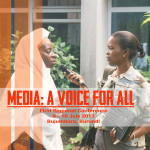Supporting Trade for Peace at the Burundi-Rwanda Border
Informal trade is a huge source of livelihood across Africa and around the world. Yet these traders, who frequently earn less than $10 a day, are vulnerable to harassment and conflict in the course of their activities. Stereotypes and rumours provoke mistrust between communities across borders and prevent traders from working together for their protection and common interests. Other issues also arise such as illegal trading, smuggling, and corruption. SFCG has been working to address these problems in the Great Lakes region of Africa, namely between Burundi, Rwanda, and the Democratic Republic of Congo, with support from USAID and a regional institution called Trademark East Africa. To further this effort, in January 2012, SFCG organized a three-day training at the Burundi-Rwanda border to work with petty traders and officials at one of the border point.
The session involved approximately 30 petty traders and 10 officials. During this training, traders were informed about their rights and responsibilities to reduce conflicts with border officials.
One of the most successful aspects of this training was the active participation of the audience. Individually or in groups, petty traders shared their experiences as well as their ideas of how to improve relationships with officials at the border. The training contained creative ways of expressing conflicts that arise at the border, such as role plays. Working in pairs, petty traders played the characters of a trader and an official and simulated a real-life situation between the two.
These practices were very successful and the audience laughed at their own behaviours. Petty traders realized why certain techniques they use to avoid officials fail and why they actually have an interest in following the law. The success of these games also showed how creativity can play an important part in how petty traders learn about their rights and responsibilities.
Officials equally benefited from the training with an opportunity to share their view about the situations. Typically, petty traders asked questions directly to the officials, who could clarify their responsibilities. On the last day of training, officials had the opportunity to express their own ideas of how to encourage peaceful relationships with petty traders.
On both sides of the border, this training has helped participants to identify some factors of the conflicts they face in their lives and realize that they can change their practices for their own benefit.
Sandra Sjogren is an intern at Search for Common Ground Rwanda and a Master’s student in International Studies at the University of Oregon. With Search, she has worked mainly for the Supporting Trading for Peace project, which is currently in the evaluation phase.









